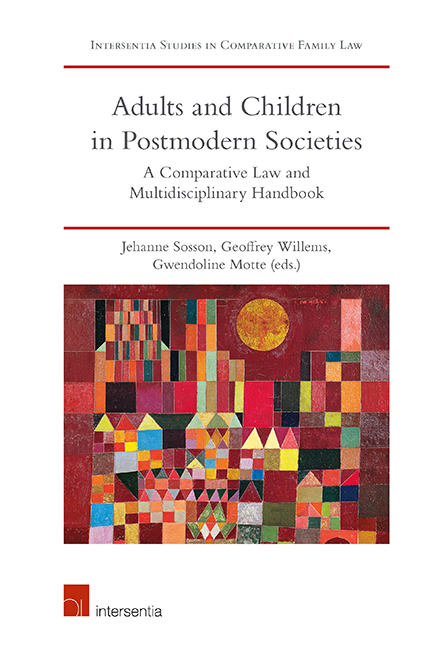Book contents
- Frontmatter
- Contents
- List of Cases
- List of Contributors
- Introduction
- PART I NATIONAL REPORTS ON LEGAL REGULATIONS OF RELATIONSHIPS BETWEEN ADULTS AND CHILDREN
- Questionnaire
- Models
- Algeria
- Argentina
- Australia
- Belgium
- Canada
- Democratic Republic of the Congo
- England and Wales
- France
- Germany
- Ireland
- Italy
- Japan
- The Netherlands
- Romania
- Spain and Catalonia
- Sweden
- Switzerland
- United States of America
- PART II INTERDISCIPLINARY APPROACH
- PART III INTERNATIONAL LAW INSIGHTS
- PART IV COMPARATIVE APPROACH
- General Conclusion: The Challenge of Transparent and Inclusive Parenthood/Parentality in a Pluralist and Cosmopolitan Context
- About the Editors
Spain and Catalonia
from PART I - NATIONAL REPORTS ON LEGAL REGULATIONS OF RELATIONSHIPS BETWEEN ADULTS AND CHILDREN
Published online by Cambridge University Press: 26 June 2019
- Frontmatter
- Contents
- List of Cases
- List of Contributors
- Introduction
- PART I NATIONAL REPORTS ON LEGAL REGULATIONS OF RELATIONSHIPS BETWEEN ADULTS AND CHILDREN
- Questionnaire
- Models
- Algeria
- Argentina
- Australia
- Belgium
- Canada
- Democratic Republic of the Congo
- England and Wales
- France
- Germany
- Ireland
- Italy
- Japan
- The Netherlands
- Romania
- Spain and Catalonia
- Sweden
- Switzerland
- United States of America
- PART II INTERDISCIPLINARY APPROACH
- PART III INTERNATIONAL LAW INSIGHTS
- PART IV COMPARATIVE APPROACH
- General Conclusion: The Challenge of Transparent and Inclusive Parenthood/Parentality in a Pluralist and Cosmopolitan Context
- About the Editors
Summary
Private law in Spain does not constitute a single legal system. Some territories created and maintained their own civil law systems over the centuries, and the Spanish Constitution of 1978 (hereafter, CE) respected and recognised this diversity, by granting them the power to preserve, amend and develop their own laws (Art. 149.1 No. 8). These law-making powers are confined to the autonomous communities which already had their own private law before 1978: Aragon; the Balearic Islands; the Basque Country; Catalonia; Galicia; and Navarre.
The scope of these territorial systems varies widely. They are far from exhaustive, and some are limited to regulating specific family, succession or property law institutions. Their gaps are filled by Spanish general law (derecho común), which operates as a default law. The answers to this questionnaire only cover Spanish general law as contained in the Spanish Civil Code (hereafter, CC) and some other statutes of general application, and Catalan law, contained in the Catalan Civil Code (hereafter, CCCat), Book 2 of which – enacted in 2010 – deals with the law of persons and family. Catalan law has made noteworthy developments in the field of adult and child relationships and is the most complete of the territorial systems mentioned above.
CHANGES IN THE TRADITIONAL FAMILY
A. MOTHERS
1. Is maternity automatically established by the birth certificate?
Following the ‘mater semper certa est’ principle, the woman who bears the child is considered the legal mother on the basis of the simple act of registering the birth at the Civil Registry (Arts. 115 No. 1 and 120 No. 5 CC). Birth registration always includes a reference to maternal filiation if the identity of the woman who has given birth can be established. If the child is born in a health centre or the birth is assisted by health professionals, the medical certificate must always state this identity. Both the woman's identity and her relationship with the newborn child have to be verified by the professionals that have intervened. The law also obliges the father and mother, next of kin, or, in their absence, any adult person present at the birth to apply for it to be recorded in the Civil Registry (Art. 45 Civil Registry Act; 3 hereafter LRC).
- Type
- Chapter
- Information
- Adults and Children in Postmodern SocietiesA Comparative Law and Multidisciplinary Handbook, pp. 481 - 514Publisher: IntersentiaPrint publication year: 2019

